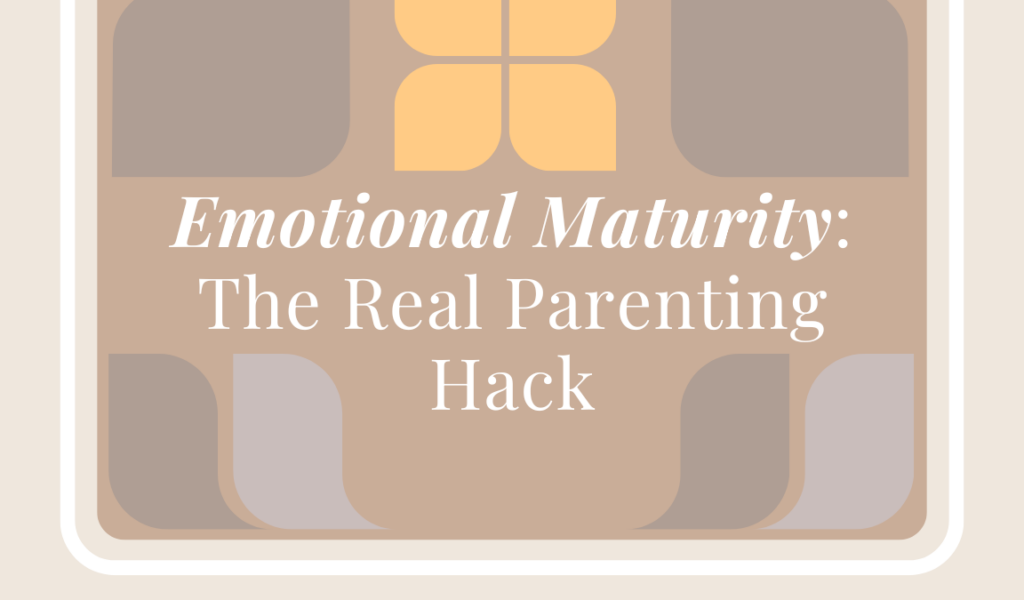
We love to talk about parenting hacks—snack hacks, sleep hacks, screen-time hacks. But there’s one “hack” that actually transforms everything beneath the surface.
It’s not trendy.
It’s not instant.
And it’s not easy.
It’s emotional maturity.
Not the kind we expect from our children…
But the kind we often forget we’re supposed to embody.
Because here’s the hard truth:
You can have all the parenting tools in the world…
You can recite every respectful phrase and follow all the scripts…
But if your nervous system isn’t regulated, and your wounds are still bleeding, you’ll use those tools as weapons—without even realizing it.
Emotional maturity is the real parenting superpower.
It’s what helps you stay anchored when your child is storming.
It’s what lets you hear the need underneath the behavior—without making it about you.
It’s what guides your response with clarity, not control.
But most of us weren’t taught how to do that.
We were taught how to perform.
How to obey.
How to avoid punishment.
How to hide our feelings so we wouldn’t upset the adults around us.
So now, when our child throws a tantrum, talks back, or refuses to listen—our bodies react like it’s a threat.
And without awareness, we parent from that threatened place.
We yell.
We punish.
We shame.
We withdraw.
We overcompensate.
We fall apart.
Not because we’re bad parents.
But because no one ever showed us what it looks like to stay grounded when we feel triggered.
And this is where emotional maturity becomes the real work.
Because emotional maturity doesn’t mean staying calm all the time.
It means learning how to return to calm with intention and compassion.
It means knowing your own wounds well enough not to project them onto your child.
It means choosing relationship over reactivity.
So how do you build emotional maturity as a parent?
Here are three powerful (but doable) ways to begin:
1. Notice before you react.
Create micro-pauses between your child’s behavior and your response.
Put your hand on your heart.
Feel your feet on the ground.
Name what you’re feeling: “I feel overwhelmed. I feel disrespected. I feel scared.”
The goal isn’t to suppress the emotion—it’s to acknowledge it before it drives your actions.
2. Tend to your triggers—not just your child’s behavior.
When something your child does lights a fire in you, ask:
- What story am I telling myself right now?
- Whose voice do I hear from my past?
- What does this moment remind me of?
Your child isn’t responsible for soothing your past. That’s your work.
But when you do it, you free your child from carrying your unhealed pain.
3. Repair, repair, repair.
You will mess up. That’s a guarantee.
But emotional maturity isn’t about perfection—it’s about ownership.
When you yell or shut down, come back and say:
“That wasn’t fair. I lost my temper, and I’m sorry. I’m working on handling my big feelings better, just like I help you with yours.”
That kind of humility doesn’t make you weak.
It makes your child feel safe.
And it models emotional maturity better than any lecture ever could.
Inside the C.A.L.M Parent Academy, we dive deep into this work!
We’re not just reading about emotional maturity. We’re practicing it.
Together.
One small, intentional step at a time.
We’re learning how to stay rooted when the chaos rises.
We’re healing what we never had, so we can become who our kids need.
We’re raising emotionally healthy children—by becoming emotionally mature parents.
This isn’t just a hack.
It’s the foundation.
And it’s the legacy your children will carry.
Are you ready to build it?
Join my weekly parenting newsletter for deeper guidance and real-life strategies for you and your children!
